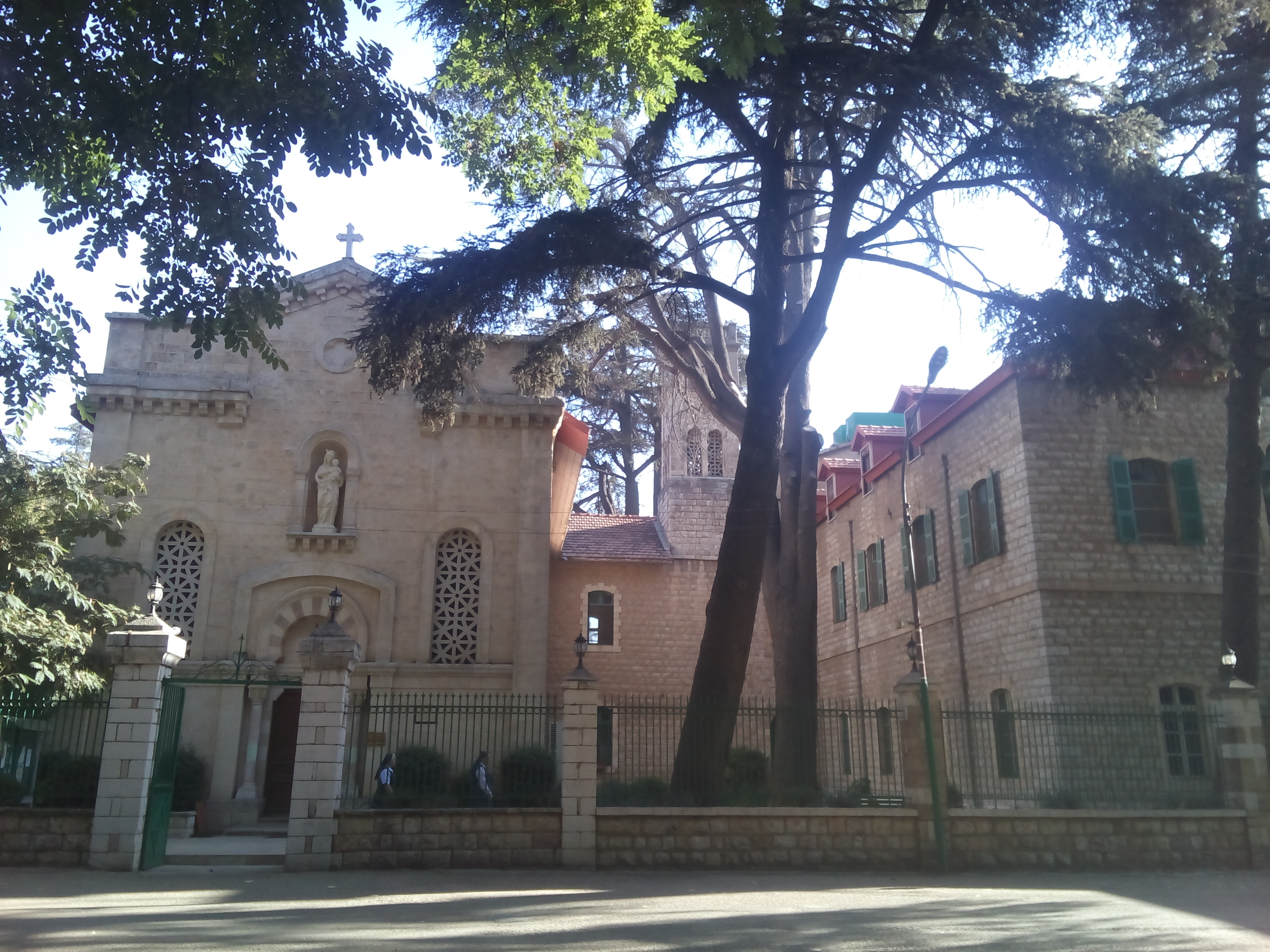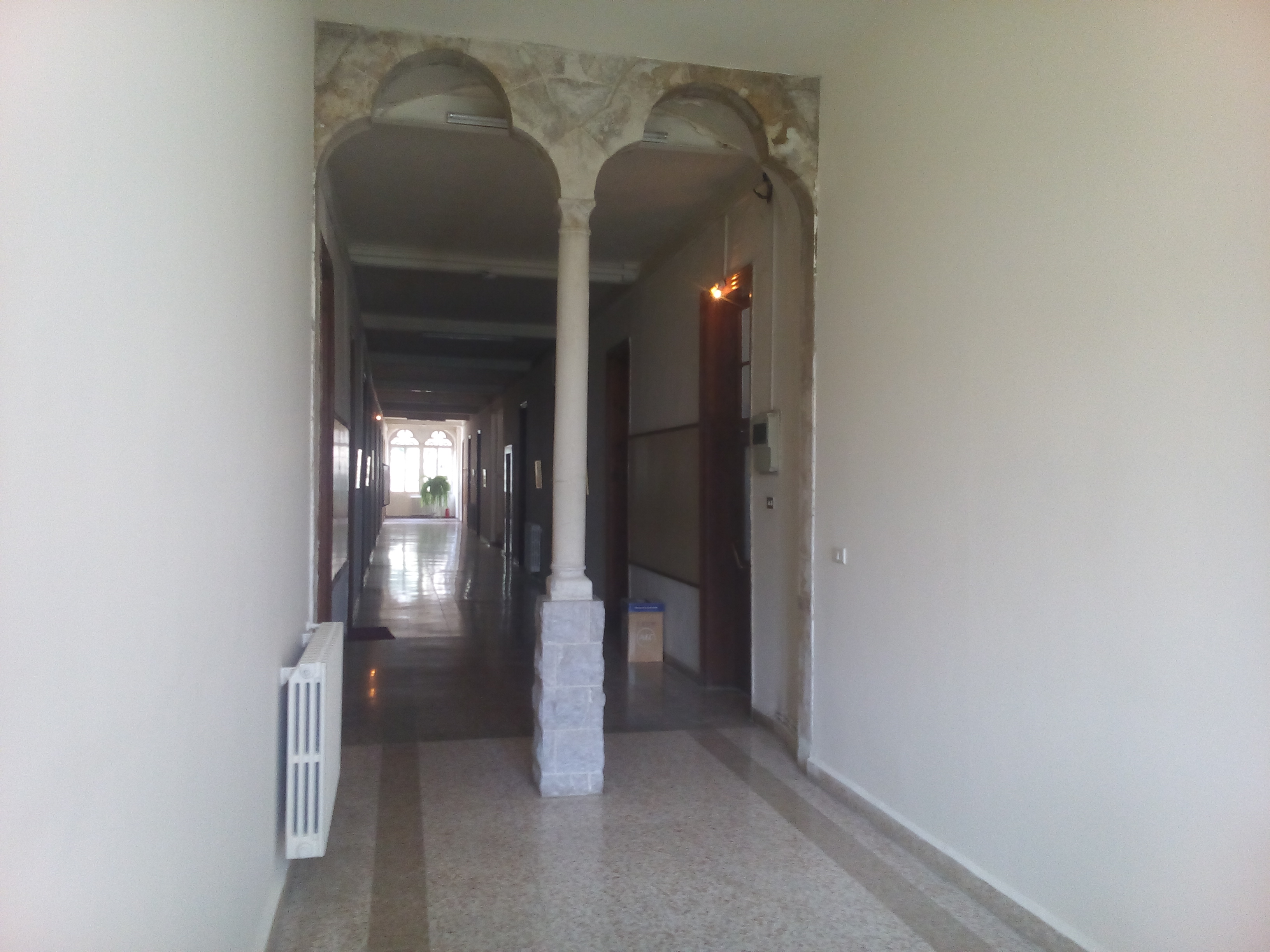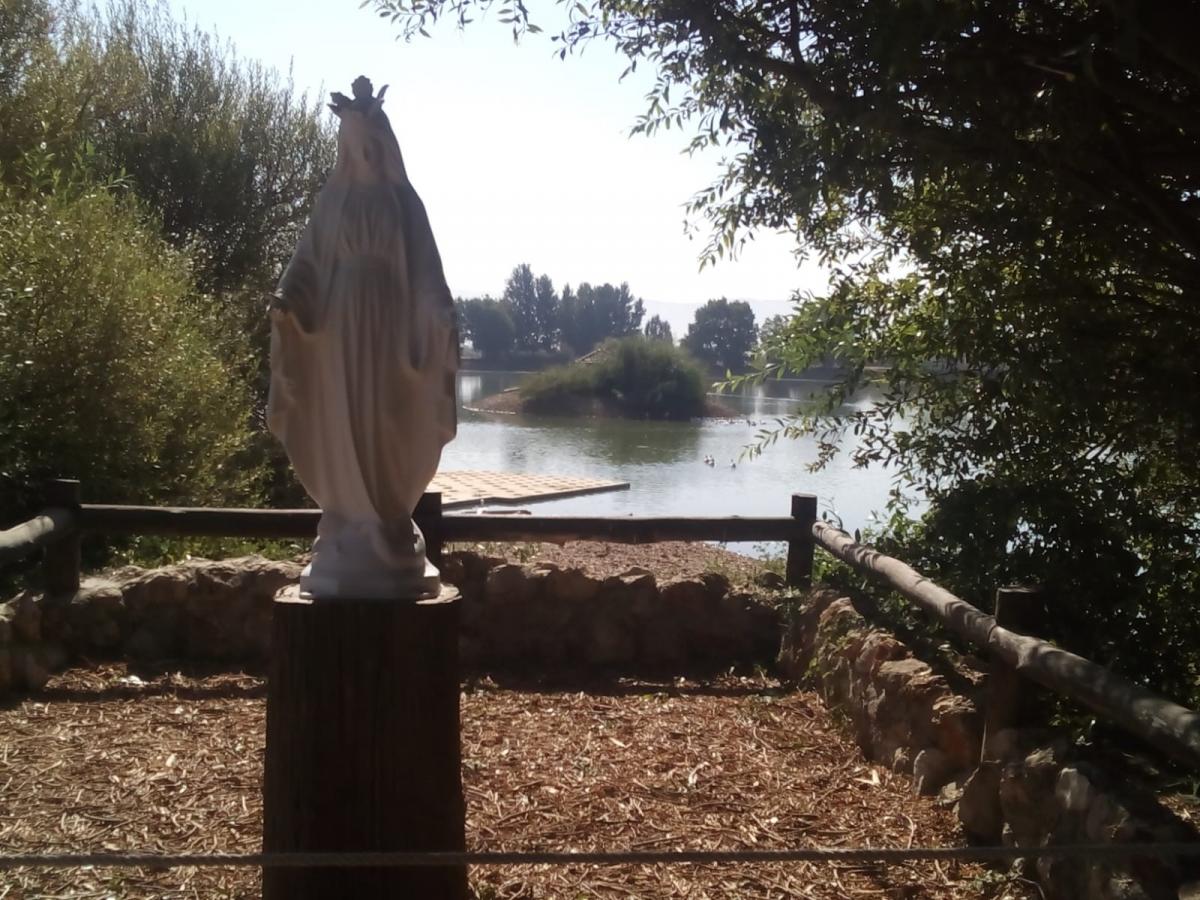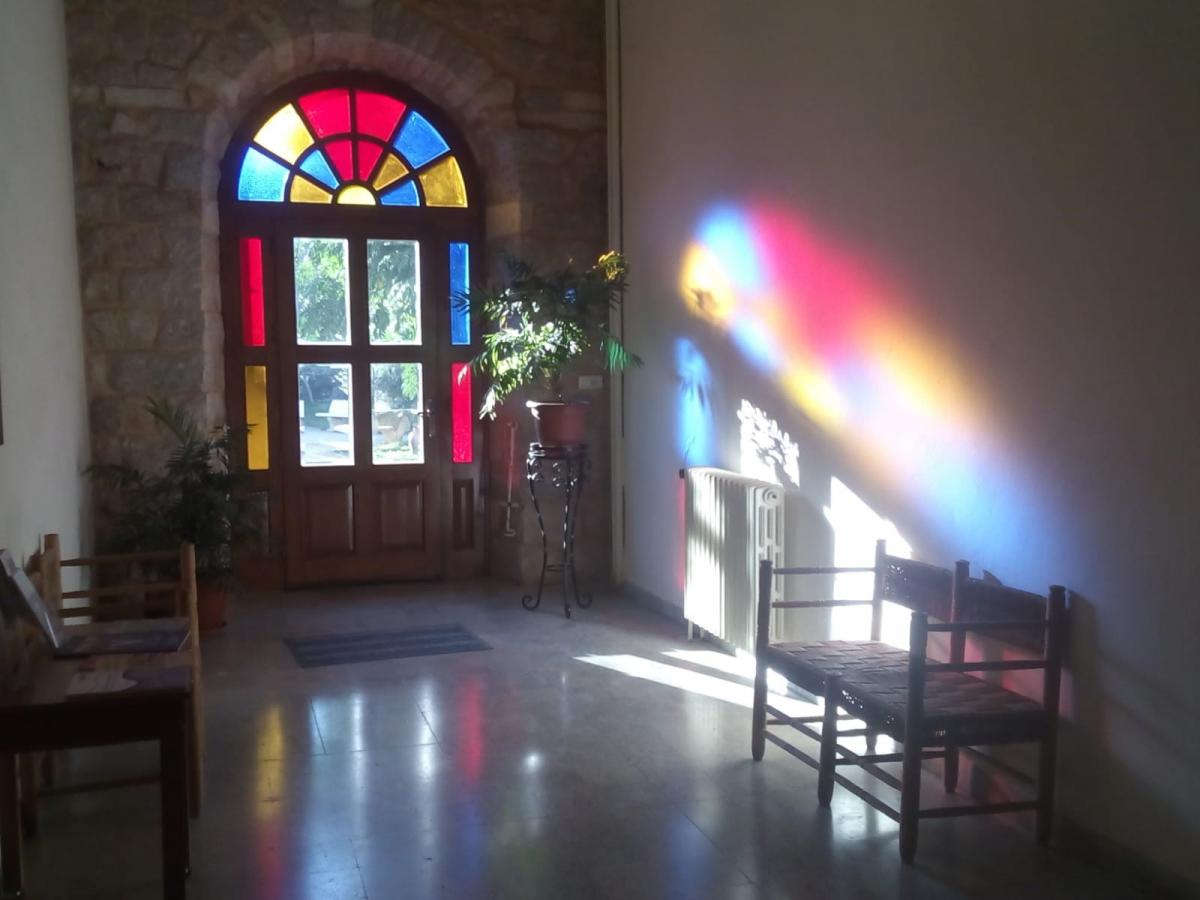Refugees, schools and things that do no happen according to plan...
March 2020
Between revolution, cold and corona - the laughter and the vitality of the children
Report after completing Sr. Anna's return
My wish to go to an Arab country and work for refugees as my stay abroad during my tertianship led me, in consultation with my superiors, in early October 2019 to Lebanon. I was meant to live with the Jesuits in Taanayel on the Bekaa valley for six months and work as a volunteer in the projects of the Jesuit Refugee Service (JRS) in the neighbouring town of Bar Elias, ultimately, I was there for 5½ months.
Almost from the beginning, my stay was characterised by extraordinary circumstances, which ran through my time in Lebanon like a common thread.
Where I lived
There was quite a lot of continuity with regard to where I lived: From the beginning to the end, I lived in the Jesuit convent in Taanayel. This temporary home, belonging to a community gave me anchoring on site, support and security in otherwise turbulent times.
I am very grateful to the six Jesuits belonging to the community that they welcomed me, a CJ sister, so openly and wholeheartedly and that I was able to share everyday life with them. Of course, everyday life in a small apostolic community is strongly influenced by the tasks of the individuals, the different rhythms that they bring with them, quite some absences and trips. It's part of our life, even I wasn't at home for lunch on school days. Having a community behind me, people I can talk to when I needed something, but also when I wanted to share my experiences and questions was a great gift for me. The link through the Ignatian spirituality and way of life was noticeable across cultural differences.
For me, it was a big help that the house of the Jesuits not only included a church and a chapel as well as a retreat and guest house, but also a large area with a park and a farm. Being able to move independently in fresh air and in nature isn’t self-evident in Lebanon. I also enjoyed watching the seasonal changes in nature and the landscape.
On the contrast, my voluntary work for JRS was strongly influenced by the troubled times. First of all, I cannot emphasise it often enough, there was and is the war in Syria, which is now in its 10th year. Without this war, there would not be so many refugees in Lebanon, more than a million Syrians live there, mostly in precarious living conditions.
In addition, the revolution, as the Lebanese themselves call the massive nationwide protests against the political elites, started during my time there. It began on October 17, 2019 and led to the resignation of the previous government. For weeks, public life in Lebanon was largely paralysed by these protests, which manifested themselves not least in blocking important streets and roads. Last but not least, the schools had to be closed for several weeks, later from time to time for some days because students and teachers could not come to school safely. So, I had to stay in the house or in the area for many days and pursue other activities. The uncertainty as to whether there is school the next day or not has become an exercise in living from one day to the other.
Added to this was the country's economic crisis, which was already evident before the revolution: the high level of public debt, the inadequate supply of electricity, water, waste disposal, etc. The protests, however, have exacerbated this economic crisis. The cost of living has risen sharply over the course of my stay, as has unemployment, restrictions on payment transactions and the import of important goods... The burdens and the high level of uncertainty experienced by the Lebanese, but also by the Syrians due to the situation were noticeable to me in many encounters and have continued to grow tightened.
My voluntary work in a JRS school in Bar Elias, in which around 500 Syrian children are taught in two shifts, was severely affected by this political and economic crisis, at least until the formation of a new government in mid-January – though the uncertainty as to whether there will be school tomorrow or not presented more serious challenges for the teaching itself, not to mention the insecurity of the children, who would actually need reliability and structure. The limitations caused by winter weather conditions with snow and ice were rather manageable in comparison. Now, the school has been closed since the end of February due to concerns about the spread of the corona virus in the country. During my stay, there were really only a few weeks during which the school operated just regularly.
My experiences at the school
In the midst of all these crises, however, I was able to get to know the work of “my” JRS school and, above all, to fall in love with the people there. I am really impressed by the commitment of the teachers and the entire team, who teach the Syrian children under difficult conditions and treat them with love and patience. I realised that it costs a lot to resist the threatening feeling of hopelessness given the living conditions of the children - all students live in informal tented settlements -, the lack of support at home, the unrest and also violence, but rather to believe wholeheartedly in the children and their future. For many children, school is not only a place of education, but also a protected and secure space. The JRS responds to this with its own psychosocial program and a social worker at each school.
And then, the students with all their joy and vitality, their laughter and verve. Of course, I also felt the difficulties in their lives, which they naturally also bring to school and which I did not always find easy to deal with. But I just took the children to my heart. There, from heart to heart, communication also worked, which was otherwise restricted by my limited knowledge of Arabic (dialect) and their rudimentary English. When the weather got better and we were able to do more sports outdoors, the sports lessons were our common highlight. In general, a personal relationship with the individual child has simply grown. One of my special gifts from this time is the experience that only my attentive, loving presence can be of great importance to people. In any case, I will miss the resounding "Sister Anna!"
In the end, it was the global corona crisis, with all the restrictions that have come with it, that led to an early end of my stay. Particularly painful for me: Due to the closure of the school, later also my departure from one day to the next, I couldn't say goodbye to all the people. There remains not only a deep gratitude for all the experiences that I was able to make in these months, the admiration for the dedication of many, the link with the people who are dear to my heart. I also take with me the awareness that I have left people in an existentially difficult situation, regardless of corona. The Syrian war continues, and further conflicts and fights in the region have not ended either. The economic crisis is worsening, and NGOs are concerned about the future of their projects. I don't want to forget the vitality and joy, the hope for peace and future, the humanity in spite of all the violence - as well as the poverty and suffering of so many people.
Help is possible
For those who want to help: This year, the Misereor fasting campaign supports the people in Syria and Lebanon in particular, also the projects of JRS. Due to the lack of divine services and other actions, it is particularly dependent on donations and alternative ways of public relations:
To the donation form: https://www.misereor.de/spenden/spendenformular?fb_item_id=26163&weani=1&country=DE
Possible activities: https://fastenaktion.misereor.de/fastenaktion-aktionen/kollekte?_ga=2.157213307.1784947929.1585168888-1312143081.1569490065#c37072
January 2020
Working as a volunteer for JRS – my first experiences
Some weeks ago, a first report of my experiences during my tertianship in Lebanon was published here. Today I will try to give some more ideas and insights of my work as a volunteer for the Jesuit Refugee Service (JRS). The political and economic situation in Lebanon remaining tense, the blocking of roads by the protesters has been less during the last weeks and the army has been reopening the blocked roads quicker – which means that on most days schools have been open now and I have been able to start working as a volunteer.
As I wrote before, JRS (https://jrs.net/en/country/lebanon/) runs three schools for Syrian children and a social centre in Bar Elias, the town neighbouring Taanayel where I live. I have now started volunteering in one of the schools, Telyani school – which I would like to present to you here.
Telyani school provides formal education to around 500 Syrian children from grade 1 to 6, what we would call primary education. There are eight classes in the morning shift and eight in the afternoon shift. In general, I stay the whole day in the school so that I see the little ones in the morning as well as the greater ones in the afternoon. Anyway, differences in age is one of the circumstances that struck me from the very beginning. Since many Syrian kids did not start schooling at the age of five (which is the usual age in Lebanon), plus were not able to attend school continuously, there are children with quite a mixture of ages in each class (which is one of my challenges when I assist a sports session). Nevertheless, the levels and learning abilities in one class also differ a lot. Not an easy situation to handle for the teachers, especially since classes go up to almost 40 students.
The room conditions can be another challenge for teaching, far away from German standards for schools – though it has started to get really cold, particularly in the morning hours and we can even expect some snow in January and February. The school with its prefabricated buildings, eight classrooms plus some rooms for sanitary facilities, administration, storage and a little kitchen for the daily sandwich for the students, made of chipboard was built by a foundation with which JRS cooperates. There is a stove in each room, however sometimes it feels rather freezingly cold, especially when there is wind and / or rain.
The greatest challenge that I observe is the fact that the children bring all their problems from their families to the classrooms – and all too often do not find a supportive learning environment at home either. All the students at Telyani school come from the surrounding “Informal Tented settlements” (ITS), Telyani actually lies amidst an ITS.
Whatever the students experienced back in Syria and on their flight to Lebanon, they live in difficult circumstances with huge families living in one place, economic difficulties and often a lack of hope. Domestic violence is a frequent issue, sometimes even abuse, health problems, but also simply the lack of structure and support. Therefore, all JRS schools have a social worker who supports students and teachers alike. Nevertheless, “class management”, creating a learning environment in the classroom with enough silence and order that allows students to follow the lesson is a big challenge, especially in the lower classes. I admire the teachers for taking up that challenge each day.
So, what is my role in all that? Actually, my main task, as I perceive it, is to be present in all of that, be there, see the person, build relationships. Then, I try to assist and support the teachers wherever that is possible – especially in the English lessons, plus Maths and Sciences that are also taught in English, finally Sports (which takes place in the schoolyard).
Sometimes I can help the weaker students to follow the lesson a little bit better. There are some activities and school projects that I can contribute to – and we will see what is still to come up. My contribution is not a great deal, I needed to accept that. However, my mere presence is of value for the people at Telyani school – which in return is a precious gift to me.
Text: Sr. Anna Schenck CJ
Photos: JRS
___
October 2019
A start into the unknown: Since the 9th October 2019, Sr Anna Schenck CJ is living in Lebanon within the framework of her terciat. She will report in irregular intervals on her experiences.
Tertianship, time to prepare for the eternal vows – getting to know the international face of the church, in practice a longer stay abroad.
Taking in account my biographical background as well as my interests, I chose Lebanon for my volunteer work in the universal church. I am living here for three weeks by now. As there is no CJ community here, I am living with the community of the Jesuits in Taanayel on the Bekaa plane, a rural area.
The community consists of six Jesuits, coming predominantly from Arabic countries and fulfilling different duties from liturgy over pastoral and retreats up to teaching at the Jesuit schools as well as the Jesuit university in Lebanon. Their house is surrounded by a large compound, including a farm as well as a parc inviting us to expanded walks.
I will be working for the Jesuit Refugee Service (JRS) that is – together with many other humanitarian organisations – manly dedicated to the many Syrian refugees in Lebanon. In Bar Elias, our neighbouring city, JRS is running three schools for Syrian children in elementary education which means until class 6. Furthermore, there is a social welfare centre who specialises in supporting and teaching women. The women have the possibility to take classes in alphabetization and English or attend vocational education trainings as tailors or hair dressers. The social welfare centre also organises home visits at the Syrian refugees’ homes to enable psycho-social care.
During my first days, I could get to know the daily live in one of the schools that is operating in a two-shift-system – in the mornings and the afternoons. To meet the special needs of the children in their current situation as well as their experiences during the war and the flight and to support the teachers, every school has a social worker.
The countrywide protests in Lebanon that started on 17th October 2019 led to the closure of the schools and all the further projects of JRS in Lebanon for an unknown period of time. One focus of the protestors is to erect street barricades to put the public life out of service. Sometimes, things come out differently…
My current challenge is to handle this unexpected situation, to remain open to Gods call for us today. I feel extremely encouraged in doing so by the local Jesuit provincial who is calling the Jesuits and all their partners to a process of discernment and disposability: What does God want to tell us through these protests and to what is HE calling us by these developments? (Here, you can read the letter of P. Dany Younes SJ, though it is only available in French.)
All the same, I hope to be able to resume my service for the Syrian refugees soon. Despite the unrests, I am well, safe and discovering something new every day.
You can bookmark this domain, as I will write further reports on my experiences in Lebanon here.
Text and Photos: Sr Anna Schenck CJ








